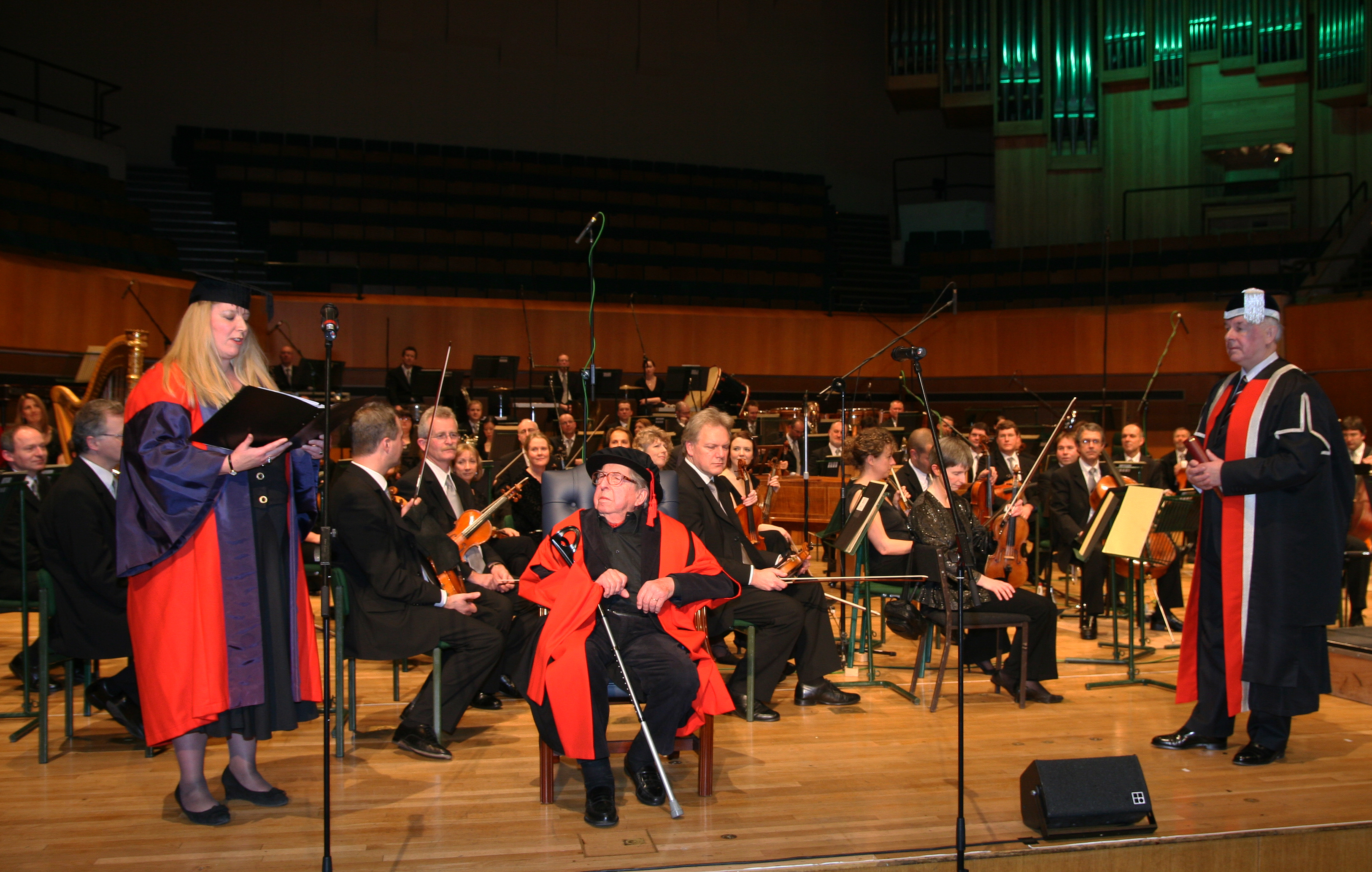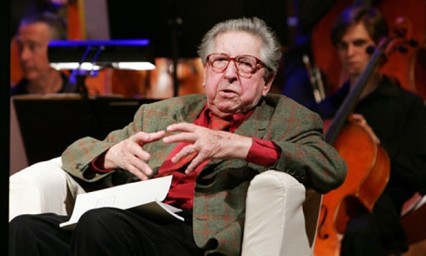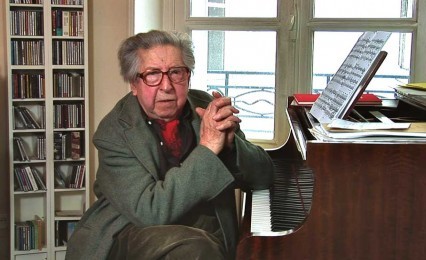Commencing Friday January 22, on what would have been Henri Dutilleux’s 100th birthday, this spring sees Cardiff hosting a major international celebration of the great French composer who died just three years ago, in 2013. Dutilleux’s ravishing music is becoming far better known in the UK and elsewhere, thanks in no small part to the efforts of French music researchers and authors, Caroline Rae and Caroline Potter (both of whom have been discussing Dutilleux throughout the week with presenter Donald Macleod on BBC Radio 3’s ‘Composer of the Week’). Caroline Rae, Reader in Music at Cardiff University, introduces Dutilleux and takes us through an exciting programme of concerts and events featuring the BBC National Orchestra of Wales and a host of visiting ensembles, composers and musicians in collaboration with the Cardiff University School of Music.
Among the most accomplished, widely celebrated and accessible composers of our time, Henri Dutilleux ranks among the greats of French music. Heir to the tradition of Debussy and Ravel, his music combines rich harmonic sensuality and luxuriant orchestral colourism in a mastery of what is often considered that most French of attributes – the magic of timbre. Achieving international prominence during the later 20th century, he remained vigorously active into the 21st, and completed a series of carefully crafted masterworks that are regularly performed throughout the world. Born in 1916, Dutilleux was blessed with longevity and continued to compose well into his nineties. Based in Paris where he resided for many years in the select location of the rue de Saint-Louis en île, where his former home now bears a commemorative plaque, Dutilleux died only three years ago in May 2013. In the year of what would have been his 100th birthday, Dutilleux’s music is being celebrated by the world’s major orchestras across the globe from Los Angeles to Tokyo as well as in London, Paris and New York.
It is fitting that Dutilleux’s centenary is also being celebrated in Cardiff.
Dutilleux had close connections with Cardiff, and during his visit to the city in 2008 for the BBC Discovering Dutilleux Festival organised by the BBC National Orchestra of Wales in collaboration with Cardiff University School of Music, was made an Honorary Fellow of Cardiff University. The historic occasion of his award followed performances by the BBC NOW of Mystère de l’instant (1989), the work that often defines the beginning of Dutilleux’s late style, and the jazzy Second Symphony ‘Le Double’ (1959) in a packed St David’s Hall; those who attended will recall his eloquent and generous acceptance speech. Then a spritely nonagenarian, Dutilleux relished his visit to Cardiff not only for the honours accorded him but also for the opportunity of retracing the steps almost certainly trodden by his compositional predecessor, Debussy, whose brother Alfred lived in the city at the turn of the 20th century. Dutilleux was also delighted by his discovery of dragons as the Welsh national emblem.

Henri Dutilleux receiving his Honorary Fellowship from Cardiff University at St David’s Hall, 2008. (L to R: Dr Caroline Rae, Henri Dutilleux & Vice-Chancellor Dr David Grant with the BBC NOW © Peter Whittaker
The BBC NOW and Cardiff University School of Music once again join forces in mounting a centenary tribute to this internationally acclaimed composer over a three-month period from January to March. While the centenary week in January is marked each day by BBC Radio 3’s Composer of the Week with Dutilleux as featured composer (18-22 January), the BBC NOW under Principal Conductor Thomas Søndergård perform Dutilleux’s pivotal exploration of transformative orchestral sound-colour Métaboles (1964) and his lyrical late work for violin and orchestra Sur le même accord (2002), with Akiko Suwanai as soloist, on the centenary day itself – 22 January – in a live Radio 3 broadcast from St David’s Hall. The Radio 3 interval feature is also devoted to Dutilleux’s music and will include discussions of his music as well as recollections of the composer’s visit to the city by Caroline Rae.
On 27 and 28 January, a pair of celebratory events takes place at BBC Hoddinott Hall and Cardiff University School of Music. Dutilleux’s last completed work, Le Temps l’horloge (2009) for soprano and orchestra, receives its Welsh premiere by the BBC NOW with conductor Pascal Rophé and soprano Elizabeth Atherton on 27 January, in a programme reflecting the enduring legacy of Dutilleux’s music through its juxtaposition with works by younger French and British composers whom he inspired and influenced: Eric Tanguy, Thierry Pécou, Julian Anderson and Kenneth Hesketh. The concert will be broadcast on Radio 3’s Hear and Now in March. On 28 January, Tanguy, Pécou and Anderson join scholars including Caroline Potter and Caroline Rae at Cardiff University School of Music for the Dutilleux Centenary Symposium at the University Concert Hall (programme downloadable at www.cardiff.ac.uk/music). Exploring Dutilleux’s music and influence, this day of public talks and discussions is led by those who knew the composer personally. The School of Music is delighted to announce that the Opening Address is to be given by Her Excellency Sylvie Bermann, the Ambassador of France to the United Kingdom. Admission to the Symposium is free.

Celebrations of Dutilleux’s centenary continue at Cardiff University School of Music with two concerts of chamber music in their Tuesday Series. On 2 February the distinguished French Quatuor Psophos combine performances of Dutilleux’s Ainsi la nuit (1976), one of the most eloquent and expressive treasures of the 20th century quartet repertory, with string quartets by Debussy and Lekeu. On 15 March the Riot Ensemble perform the final version of Les citations, completed in 2010 when Dutilleux was 94. Renowned for undertaking fastidious revisions of many of his works, Dutilleux was a notoriously slow worker who often chose to review significant elements of his music even after publication. Originally published in 1985 Les citations is no exception, its instrumentation for the unusual combination of oboe, double bass, harpsichord and percussion nodding in the direction of Debussy’s late Sonates pour divers instruments while providing a contemporary twist.
Cardiff is playing a major part in a truly international celebration of Dutilleux’s music in this centenary year. While the death of a composer may often be followed by a decline in performances of the music, there has been no abate of interest in the work of Dutilleux whose wide-reaching influence and enduring legacy place him among the greatest and most celebrated composers of our time.
Header image of Henri Dutilleux courtesy of the University of Cardiff












